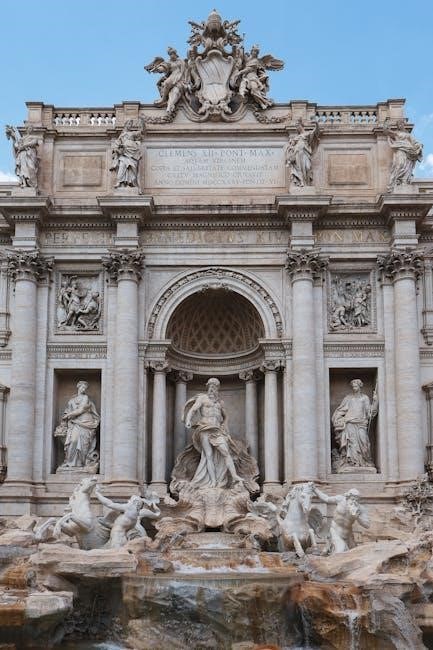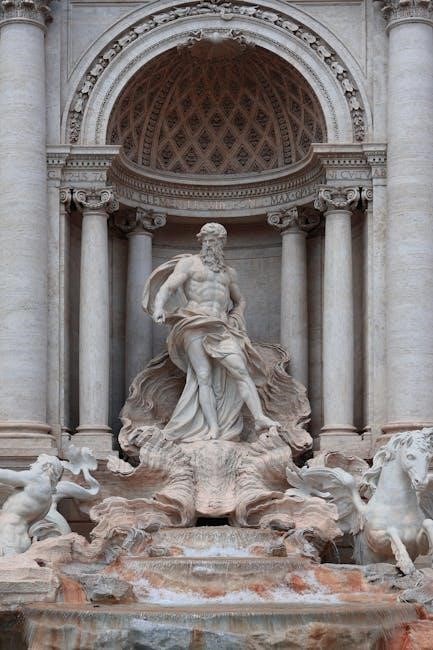
cirano di bergerac pdf
Cyrano de Bergerac, a play by Edmond Rostand, premiered in 1897, becoming a landmark of French Romantic drama․ It tells the story of Cyrano, a charismatic swordsman with a large nose, blending wit, honor, and unrequited love․ The play’s success propelled Rostand to fame at just 28, revitalizing theatrical Romanticism․
1․1 Background of the Play
Cyrano de Bergerac, a play by Edmond Rostand, was first performed in 1897 at the Théâtre de la Porte Saint-Martin in Paris․ This romantic drama, written in verse, tells the story of Cyrano, a charismatic but insecurities-ridden swordsman and poet, known for his large nose and exceptional wit․ The play is loosely based on the life of the historical figure Savinien Cyrano de Bergerac, a 17th-century French writer and swordsman․ Rostand’s work blends humor, drama, and adventure, capturing the spirit of 17th-century France while exploring universal themes of love, honor, and identity․
The play’s success was immediate and unprecedented, making Rostand, then just 28 years old, a celebrated figure in French literature․ Its premiere marked a revival of Romanticism in theater, offering a refreshing contrast to the naturalistic trends of the time․ The play’s enduring appeal lies in its vivid characters, poetic dialogue, and the timeless story of unrequited love, as Cyrano aids his cousin Christian in wooing Roxane, the woman he secretly adores․

Cyrano de Bergerac remains a cultural icon, inspiring numerous adaptations and cementing its place as one of the most cherished works of French literature․

1․2 Historical Context
Cyrano de Bergerac, written by Edmond Rostand, is set in 17th-century France, a time of rich cultural and literary transformation․ The play draws inspiration from the real-life figure of Savinien Cyrano de Bergerac, a French writer, swordsman, and philosopher known for his imaginative works, such as L’Autre Monde: ou les États et Empires de la Lune․ Rostand’s adaptation captures the essence of Cyrano’s personality—his wit, bravery, and romantic ideals—while weaving a fictional narrative around his life․
The play premiered in 1897, a period marked by the decline of Romanticism and the rise of Naturalism in literature․ Rostand’s work revitalized Romantic ideals, offering a nostalgic escape into a heroic past․ Its success resonated with audiences, making it a cultural phenomenon and solidifying its place in French literary history․ The historical context of both the 17th-century setting and the late 19th-century revival of Romanticism gives Cyrano de Bergerac a unique dual significance, blending historical authenticity with artistic innovation․
This duality has made the play timeless, appealing to audiences across generations with its universal themes of love, honor, and self-sacrifice․
1․3 Author Information
Edmond Rostand, the celebrated French playwright and poet, was born on April 1, 1868, in Marseille, France․ Rostand’s literary career began at a young age, with his first play, Le Gant Rouge, debuting in 1888․ However, it was Cyrano de Bergerac, written in 1897, that catapulted him to fame, earning him widespread acclaim and establishing him as a leading figure in French literature․
Rostand’s unique style blended Romanticism with a modern sensitivity, creating works that resonated deeply with audiences․ His ability to craft vivid characters and poetic dialogue set him apart, and his plays often explored themes of love, honor, and identity․ Cyrano de Bergerac not only became a defining work of his career but also a cultural icon, influencing countless adaptations and interpretations․
In 1901, Rostand was elected to the Académie Française, a prestigious honor recognizing his contributions to French literature․ Despite his untimely death in 1918, Rostand’s legacy endures, with Cyrano de Bergerac remaining a timeless masterpiece of theatrical Romanticism․
1․4 Publication Details
Cyrano de Bergerac, written by Edmond Rostand, was first published in 1897 by the French publishing house Eugène Fasquelle․ The play premiered at the Théâtre de la Porte Saint-Martin in Paris on December 28, 1897, starring the renowned actor Benoît-Constant Coquelin in the title role․ Its immediate success led to widespread recognition and numerous translations worldwide․
The original French version was published in book form shortly after its theatrical debut, featuring a preface by Rostand․ Over the years, the play has been translated into multiple languages, including English, Italian, and Spanish, with notable translations by Gladys Thomas, Mary F․ Guillemard, and Anthony Burgess․ These adaptations have ensured the play’s enduring popularity across cultures․
In addition to its theatrical and literary success, Cyrano de Bergerac has been adapted into various formats, including films, operas, and stage adaptations․ Its timeless themes and poetic language continue to captivate audiences, solidifying its place as a cornerstone of French Romantic literature․

Main Characters
The play revolves around Cyrano de Bergerac, a charismatic swordsman with a large nose, Christian de Neuvillette, a young noble, Roxane, the beautiful woman they both love, and Comte de Guiche, the antagonist․ Other key characters include Ragueneau, Le Bret, and the Cadets, who add depth and humor to the story․
2․1 Cyrano de Bergerac

Cyrano de Bergerac, the protagonist, is a charismatic and intelligent swordsman with a distinctive large nose․ Based on the historical figure Savinien Cyrano de Bergerac, the character is known for his wit, bravery, and unrequited love for Roxane; Cyrano’s complexity lies in his dual nature: he is both a fierce warrior and a sensitive poet․ His large nose becomes a symbol of his uniqueness and pride, yet it also fuels his insecurity․ Cyrano’s story is one of selfless love and honor, as he assists Christian in wooing Roxane, despite his own feelings for her․ The character’s blend of humor, heroism, and vulnerability has made him an iconic figure in world literature․ Edmond Rostand’s portrayal of Cyrano de Bergerac captures the essence of French Romanticism, emphasizing individuality and emotional depth․ Cyrano’s legacy extends beyond the play, inspiring countless adaptations and interpretations, cementing his place as one of the most memorable characters in theatrical history․
2․2 Christian de Neuvillette
Christian de Neuvillette is a young nobleman and one of the central characters in Cyrano de Bergerac․ He is portrayed as handsome and charming but lacks the confidence and eloquence to express his feelings to Roxane, the woman he loves․ Christian’s insecurity leads him to seek the help of Cyrano, who becomes his ally in wooing Roxane․ Despite his good looks, Christian struggles with self-doubt and relies heavily on Cyrano’s poetic genius to convey his emotions․ Their partnership is marked by mutual respect, with Christian acknowledging Cyrano’s intellectual superiority while Cyrano admires Christian’s bravery and sincerity․ Throughout the play, Christian evolves from a timid suitor into a mature and courageous individual, particularly during the war scenes․ His relationship with Roxane and Cyrano highlights themes of love, honor, and identity, as he ultimately comes to understand the depth of Roxane’s affection for the spirit behind the words, rather than mere physical appearance;
2․3 Roxane

Roxane is the beautiful and intelligent niece of the wealthy Monsieur de Guiche, and she is the object of both Cyrano’s and Christian’s affections․ She is a strong-willed and independent noblewoman who values deeper connections and intellectual compatibility over superficial charm․ Roxane’s love for Christian is rooted in his physical appearance, but she is also drawn to the poetic and emotional depth of the letters he sends her, unaware that Cyrano is the true author․ Her character represents the ideal of romantic love, blending physical attraction with intellectual and emotional resonance․ Roxane’s interactions with Cyrano reveal her admiration for his wit and bravery, even as she remains oblivious to his unspoken love for her․ Throughout the play, Roxane’s loyalty and devotion are tested, ultimately leading to a poignant realization of the true nature of her feelings․ Her role in the story underscores themes of love, identity, and the complexities of human relationships, making her a central and enduring figure in the narrative․
2․4 Comte de Guiche
Comte de Guiche is a wealthy and influential nobleman in 17th-century France, serving as Roxane’s uncle and guardian․ He is ambitious, cunning, and manipulative, often using his power to achieve his own ends․ De Guiche is determined to marry Roxane off to a man of his choice, disregarding her personal desires․ His character represents the societal pressures and political maneuvering of the time, as he seeks to maintain and expand his family’s influence․ De Guiche is also a rival to Cyrano, frequently clashing with him due to their opposing values and interests․ Despite his arrogance, he is a formidable opponent, utilizing his resources and connections to undermine those who stand in his way․ His interactions with Roxane and Cyrano highlight themes of power, manipulation, and the constraints of societal expectations, making him a significant antagonist in the play․

Plot Summary
Cyrano de Bergerac tells the story of Cyrano, a charismatic swordsman with a large nose, who assists Christian in wooing Roxane․ The play explores themes of love, honor, and identity, set against 17th-century France’s rich backdrop․
3․1 Act 1
Act 1 of Cyrano de Bergerac introduces the protagonist, Cyrano, a charismatic and skilled swordsman with a notoriously large nose, in 17th-century Paris․ The scene opens at the Theatre du Marais, where Cyrano’s reputation as a duelist and poet precedes him․ The porter announces the evening’s entertainment, and Cyrano’s presence commands attention․ Christian de Neuvillette, a young nobleman, arrives seeking Roxane, Cyrano’s distant cousin, whom he hopes to woo․ Cyrano learns of Roxane’s admiration for Christian and offers his assistance, despite his own unspoken love for her․ The act culminates in a confrontation with Montfleury, an actor mocked by Cyrano for his performance, showcasing Cyrano’s wit and bravery․ This sets the stage for the unfolding drama of love, honor, and identity․

3․2 Act 2

Act 2 of Cyrano de Bergerac unfolds in Ragueneau’s pastry shop, a gathering place for poets and actors․ Cyrano, determined to help Christian win Roxane’s heart, devises a plan to express Christian’s feelings through his own poetic skill․ Christian, however, struggles with self-doubt, fearing his inability to match Roxane’s intellectual sophistication․ Cyrano’s internal conflict deepens as he agrees to write letters on Christian’s behalf, despite his own unspoken love for Roxane․ The act showcases Cyrano’s wit and poetic prowess, as well as his loyalty to Christian․ Meanwhile, the Comte de Guiche schemes to undermine Cyrano’s efforts, revealing his own interest in Roxane․ The tension escalates when the Vicomte de Valvert, mocked by Cyrano earlier, challenges him to a duel․ Roxane’s arrival complicates matters further, as she requests a private meeting with Christian, unaware of Cyrano’s hidden role in their budding relationship․

3․3 Act 3
Act 3 of Cyrano de Bergerac takes place in Roxane’s chamber, where Cyrano and Christian prepare for Roxane’s visit․ Cyrano, hiding behind a curtain, feeds Christian the words to woo Roxane, emphasizing the depth of his own unspoken feelings․ Roxane, enchanted by the poetic expressions, begins to fall deeply in love with Christian, unaware of Cyrano’s role․ Meanwhile, the Comte de Guiche, determined to undermine Cyrano, orchestrates a distraction to disrupt the meeting․ Cyrano’s internal conflict intensifies as he witnesses Roxane’s growing affection for Christian, while he himself remains silent about his own love․ The act highlights Cyrano’s selflessness and poetic brilliance, as well as the tragic irony of his situation․ Roxane’s emotions reach a peak, and Christian, though awkward, benefits from Cyrano’s guidance․ The scene ends with Roxane declaring her love for Christian, leaving Cyrano heartbroken but resolute in his loyalty․
3․4 Act 4
Act 4 of Cyrano de Bergerac unfolds in a convent where Roxane has retreated after Christian’s death․ Cyrano, continuing his loyal service, visits Roxane daily, bringing letters he writes in Christian’s name․ Roxane, grief-stricken, clings to these letters as her last connection to her beloved․ Cyrano’s deep love for Roxane remains unspoken, as he maintains the illusion that Christian is the author of the heartfelt words․ The act explores themes of loyalty, unrequited love, and the enduring power of words․ Roxane’s emotional dependence on the letters grows, while Cyrano’s internal anguish deepens, as he sacrifices his own feelings to honor his promise․ The Abbess, concerned for Roxane’s well-being, urges her to move on, but Roxane refuses, insisting on preserving the memory of her love․ The act concludes with Cyrano leaving Roxane, his silence a testament to his unwavering dedication and the tragic circumstances that bind them all․
3․5 Act 5
Act 5 of Cyrano de Bergerac brings the story to its poignant conclusion․ Years have passed, and Cyrano, now an old and injured man, visits Roxane at her convent․ Roxane, still grieving Christian’s death, learns the truth about the letters when Cyrano, on his deathbed, reveals he was their author․ Overcome with emotion, Roxane realizes her love for Cyrano but is too late to express it․ Cyrano’s unwavering loyalty and unspoken love culminate in his final moments, as he dies surrounded by Roxane and his loyal friend, Le Bret․ The play ends with Roxane, now understanding the depth of Cyrano’s devotion, vowing to honor his memory and the love they shared in silence․ Act 5 underscores themes of sacrifice, truth, and the enduring power of love, leaving audiences with a profound sense of tragedy and admiration for Cyrano’s noble spirit․
Themes and Motifs
Cyrano de Bergerac explores timeless themes of love, honor, and identity․ Love transcends physical appearance, while honor and loyalty guide the protagonist’s actions․ Identity is central, as Cyrano struggles with self-acceptance and societal expectations, enriching the play’s emotional depth․
4․1 Love
Love is a central theme in Cyrano de Bergerac, explored through various forms and complexities․ Cyrano’s unrequited love for Roxane drives the narrative, showcasing his selfless devotion and poetic expression․ Despite his deep feelings, he hides behind his wit and bravery, unable to reveal his emotions directly․
Roxane, idealizing love, seeks a union of intellect and beauty, initially drawn to Christian’s appearance but later moved by the eloquence of Cyrano’s words․ Christian, though smitten, struggles with expressing his feelings, relying on Cyrano’s aid to win Roxane’s heart․
The play highlights the tension between romantic idealism and reality․ Cyrano’s love remains unspoken, yet he finds fulfillment in helping Christian and Roxane, embodying the idea of love as sacrifice․ Ultimately, Roxane realizes too late that Cyrano’s words were the true expression of his love, leaving a poignant reflection on the power and tragedy of unspoken emotions․
4․2 Honor
Honor is a defining theme in Cyrano de Bergerac, deeply woven into the protagonist’s character and actions․ Cyrano’s unwavering commitment to his personal code of honor drives his decisions, even in the face of adversity․ His refusal to compromise his values, whether in matters of love, friendship, or societal expectations, underscores his integrity․
Cyrano’s sense of honor extends beyond individual pride; it encompasses loyalty to others․ He protects his fellow cadets and stands up for the playwright Lignière, demonstrating a strong moral compass․ His refusal to reveal his feelings to Roxane out of respect for Christian highlights his honor-bound dedication to friendship․
Moreover, Cyrano’s honor is tied to his identity as a Gascon and a swordsman․ He adheres to a chivalric code, rejecting patronage and wealth that might tarnish his reputation․ This unwavering commitment to honor ultimately defines Cyrano’s legacy, making him a timeless symbol of integrity and selflessness․
4․3 Identity
Cyrano de Bergerac’s identity is a complex interplay of physical appearance, intellectual prowess, and emotional depth․ His oversized nose, a defining feature, becomes both a source of insecurity and a symbol of his uniqueness․ Cyrano embraces his individuality, refusing to conform to societal expectations, and instead celebrates his distinctiveness through wit and creativity․
As a poet, swordsman, and philosopher, Cyrano’s identity is multifaceted․ He is a Gascon, proud of his provincial roots, yet equally at home in the intellectual circles of Paris․ His identity is also shaped by his unrequited love for Roxane, which he expresses through his poetry and actions, blending romance with self-sacrifice․
Cyrano’s struggle with self-acceptance is central to his character․ Despite his insecurities, he maintains a strong sense of self, refusing to compromise his values․ His identity is ultimately defined by his courage, loyalty, and the way he navigates the tension between his inner self and the world around him․
Through Cyrano’s journey, Rostand explores the universal theme of self-discovery, highlighting the importance of embracing one’s true identity, flaws and all, to achieve authenticity and fulfillment․
Literary Significance
Cyrano de Bergerac, written by Edmond Rostand in 1897, is a landmark of French Romantic drama, blending wit, poetry, and heroism; Its success revitalized French theatre and cemented Rostand’s reputation, leading to his election to the Académie Française in 1901․ The play’s enduring appeal lies in its universal themes and its influence on later literary and theatrical works, marking a bridge between Romanticism and modern drama․
5․1 Romanticism
Cyrano de Bergerac embodies the spirit of Romanticism through its vivid imagery, emotional depth, and celebration of individualism․ The play’s poetic language, written in verse, captivates audiences with its lyrical beauty and dramatic flair․ Rostand’s masterpiece reflects Romantic ideals by emphasizing passion, honor, and the triumph of the human spirit over adversity․ Cyrano’s larger-than-life personality, marked by his wit, bravery, and unrequited love, exemplifies the Romantic hero archetype․ The play’s themes of love, sacrifice, and self-sacrifice further align with Romanticism’s focus on emotional expression and idealism․ Additionally, the play’s swashbuckling adventure and historical setting evoke a sense of nostalgia and grandeur, characteristic of Romantic literature․ Rostand’s work not only revitalized French Romantic drama but also influenced later literary movements, making Cyrano de Bergerac a timeless classic․ Its enduring appeal lies in its ability to balance poetic elegance with profound emotional resonance, solidifying its place as a cornerstone of Romantic theatre․
5․2 Edmond Rostand’s Career
Edmond Rostand’s career reached its zenith with the monumental success of Cyrano de Bergerac in 1897․ At just 28 years old, Rostand became a leading figure in French drama, earning acclaim for his poetic and energetic storytelling․ The play’s triumph not only established Rostand as a master of Romantic theatre but also revitalized the genre, which had begun to wane․ His election to the prestigious Académie Française in 1901 further cemented his reputation as a literary giant․ Rostand’s work, particularly Cyrano, marked the pinnacle of French Romantic drama, blending wit, passion, and heroism in a way that captivated audiences worldwide․ Despite his later works not achieving the same level of success, Rostand’s legacy endures, with Cyrano de Bergerac remaining a cornerstone of world literature and theatre․ His ability to craft compelling characters and narratives continues to inspire writers and playwrights, ensuring his place in literary history․